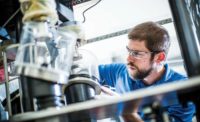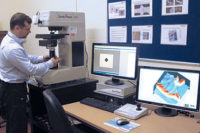One of those services is testing. In addition to manufacturing the resins that are used to construct composite laminates used in products ranging from boats to storage tanks to satellite dishes, Reichhold also provides materials testing for its composite fabricator customers. In all, the company performs nearly 100 different tests for a wide variety of mechanical, flexural, tensile and other properties, on everything from raw materials through final products.
Reichhold's ability to run the gamut of physical property tests for its customers sets it apart from many of its competitors. As a result, the company has experienced a jump in the demand for its testing services. Indeed, according to Bruno Belanger, Reichhold's physical testing manager, the number of specimens tested by the company has nearly doubled within the last two years.
As the testing service took off, Reichhold began to reevaluate its approach to testing. "We considered changes in the testing process that would allow us to keep pace with demand and still maintain quick turnaround," Belanger relates. For assistance, Reichhold turned to Instron Corp. (Canton, MA), a provider of materials testing equipment. Instron had already provided about a dozen machines used by Reichhold in its physical testing lab.
Working together, Belanger and Instron representatives defined the specifications for a fully automated testing system that would help Reichhold significantly boost its capacity. "We tried to build a more capable machine for turnaround in critical areas where it could have the most impact," Belanger explains. The result was the development of a customized version of Instron's TestMaster Automation System that works with an Instron universal testing system, the Model 5585 Floor Mounted Materials Testing System.
Reichhold had relied upon its lab technicians to manually operate the testing machine. The new system automates the process. A master software suite that coordinates and supervises the actions of both a material handling robot and the universal testing instrument controls the system. The robot moves the specimens from storage magazines or racks through an automatic identification and dimension measurement sequence and then installs the specimen in the grips of the testing instrument. The universal testing machine performs the required tests, collects and analyzes data and prepares a report of test results. Once the sequence is started, all this takes place with no operator involvement.
The new system allows Reichhold to reduce turnaround time for some tests by 50%, says Belanger. Automating the testing process affords technicians the time to do more applications-oriented work, such as critical analysis and interpretation of test results, he adds. Because Reichhold personnel do not need to focus on the mechanics of performing a test, they can put more focus on more value-added tasks such as data analysis.
"As our customers are getting more technology-oriented, they face the need for more data," explains Belanger. "Test results serve as a great source of information. In fact, our customers are able to adjust and improve their products based on this data. Having the capability to provide this information to our customers is crucial to Reichhold's success."
Instron Corp.
(800) 564-8378 Reply 11
www.instron.com
BENEFITS
- Once the test sequence is started, no operator involvement is required.
- The automated materials testing system allows Reichhold to reduce turnaround time for some tests by 50%.
- Because technicians do not need to focus on the mechanics of performing a test, they can focus more on value-added tasks such as data analysis.

